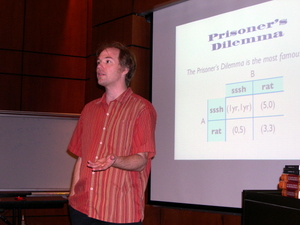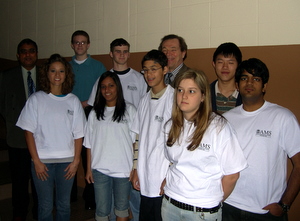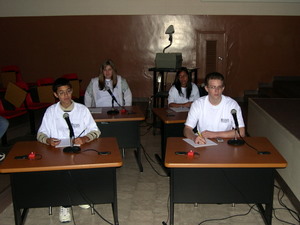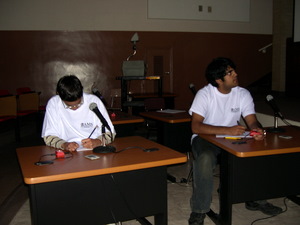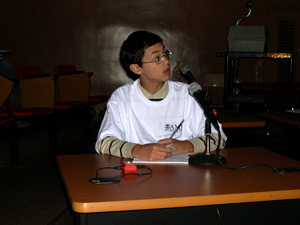
Who Wants to Be a Mathematician in Arkansas
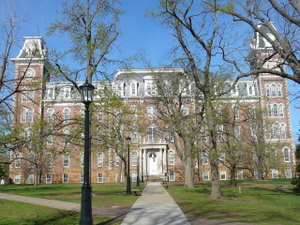 |
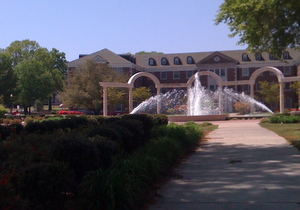 |
"Thank you so much for making the trip to Arkansas to support our young mathematicians."
"All of us had a great time. People are still talking about the show."
The state of Arkansas lived up to its nickname as "The Land of Opportunity" for some of its best high school students, when Who Wants to Be a Mathematician came for two straight days of the AMS math game and math talks by university faculty. On day one, April 15, the University of Arkansas (in Fayetteville) hosted the events, and then the next day the University of Central Arkansas (in Conway) was the host. There was a great turn-out with very enthusiastic and creative audiences each day.
Who Wants to Be a Mathematician at the University of Arkansas
Who Wants to Be a Mathematician at the University of Central Arkansas
... at the University of Arkansas
Up to One Million Dollars in Prize Money May Be Given Away, Chaim Goodman-Strauss, University of Arkansas Department of Mathematical Sciences
|
|
Goodman-Strauss gave the audience an introduction to game theory, which he said was a subject at the intersection of mathematics, economics, and psychology. In his experiment that led to the lecture title, he asked each member of the audience to write a number bigger than 1 on a slip of paper. The largest number on all the slips, call it n, would win the person who wrote the number US$1,000,000/n (in case of a tie, those with the winning number would split the amount evenly). Goodman-Strauss even showed the box that had the $1,000,000 inside (although since no one was allowed to look in the box, some were doubtful as to the contents). |
A large number would increase a person's chance of winning, but decrease the reward. The audience worked through different outcomes, for example if everyone wrote "1," is it likely that someone would win with "2?" "3?" etc. People were awarded books for good analysis and answers during this discussion and subsequent ones. The winning number, written by four people, was 1,000,000. Two people wrote expressions standing for one more than the largest number on any slip, which also earned them a book.
Goodman-Strauss and the audience also analyzed "Rock, Paper, Scissors," and matching games (in which one player wins if there is a match, while the other wins if there is no match), and Prisoner's Dilemma. He finished with a little information about Nash equilibria and how their existence was proved using topology.
Who Wants to Be a Mathematician
After some cookies, which eased the pain of not going home with $1,000,000, eight Arkansas students played two games of Who Wants to Be a Mathematician. The eight contestants are pictured below with Goodman-Strauss, and Who Wants to Be a Mathematician emcee Mike Breen.
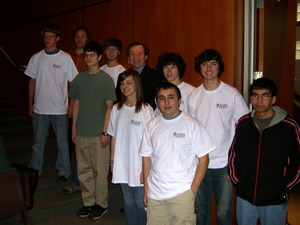 |
Front (left to right):
|
Back (left to right):
|
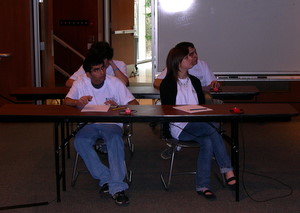 |
Game one was won by Karan Batra, in a close contest with Tristan Sokol. Karan won the game with only one incorrect answer, which occurred on question four. (Front: Karan Batra, Katie Smith; Back: Tristan Sokol, Alex Wilson)
|
Between the games, for the benefit of any non-Arkansans present, one of the contestants' classmates led the audience in a rousing "Calling of the Hogs," which set the tone for a rousing game two.
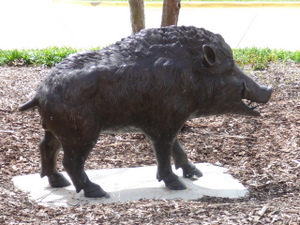 |
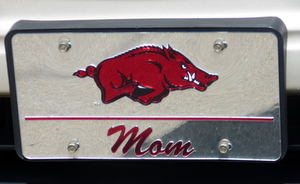 Three looks at the hogs |
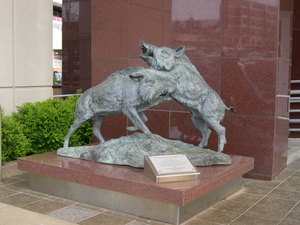 |
Led by a contingent of 50 students from Cabot High School (sporting "Spencer on a stick"), the very vocal, supportive rooting sections in game two--including students and teachers from Arkadelphia and Har-Ber High Schools--made their presence known.
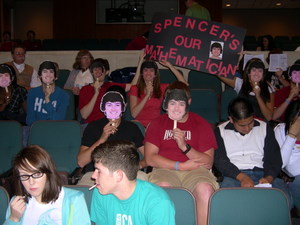 |
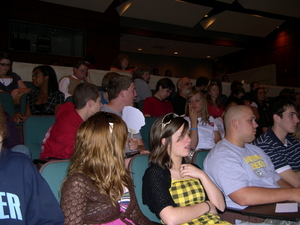 |
The contestants provided plenty to root for as well as a good deal of suspense as three contestants were within 200 points of one another going in to the last question. Kyle Strong answered the last question correctly, which earned him the victory as he edged out Camden Dwelle and Spencer Sharp, who finished second and third, respectively.
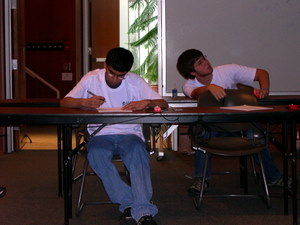 |
The two winners, Karan and Kyle, squared off on one question for the right to go to the Bonus Round. It was Kyle who signaled in first and answered correctly to win the Square-Off Round and earn a chance at the Bonus Question. Kyle looked pretty confident in the Bonus Round, and for good reason, as he also answered this question correctly, earning a total of $1250, all donated by the University of Arkansas Department of Mathematical Sciences. |
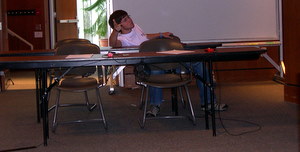 |
 |
The prizes won by all the contestants from the game in Fayetteville:
- $1250 from the University of Arkansas Department of Mathematical Sciences: Kyle Strong
- $250 from the University of Arkansas Department of Mathematical Sciences: Karan Batra
- Maple 12 from Maplesoft: Tristan Sokol and Camden Dwelle
- Calculus with Early Transcendentals by Anton, Bivens and Davis from John Wiley and Sons: Katie Smith and Spencer Sharp
- What's Happening in the Mathematical Sciences from the AMS: Alex Wilson and William Buehling
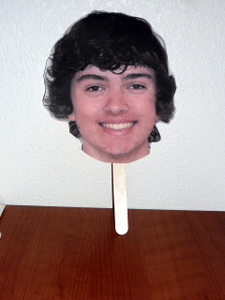 |
The contestants for both games are fairly young: one freshman, one sophomore, four juniors (including Spencer Sharp), and only two seniors. Visit the Math Factor website where you can hear an interview with Chaim and Mike about the day's events.
... at the University of Central Arkansas
Math and Music, David Peterson, University of Central Arkansas Department of Mathematics
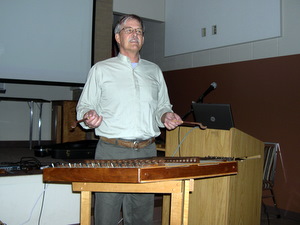 |
Peterson (at left, playing a dulcimer) delighted the overflow crowd with his lecture about some of the mathematics behind sound and music. He used two dulcimers, a guitar, a homemade marimba, and some recorded music to illustrate equations for frequency and harmonic frequencies. Peterson finished with a discussion of Fourier series, showing how even an unsmooth function could be approximated by a finite sum of trigonometric functions. He remarked that human brains are suited for Fourier series, because if one of the terms is missing from a Fourier sum, then the sound will be displeasing to us.
|
Who Wants to Be a Mathematician
After some tasty treats and refreshments supplied by the department, some central Arkansas students--backed by many clever t-shirts and signs--"came down" for their chance at Who Wants to Be a Mathematician.
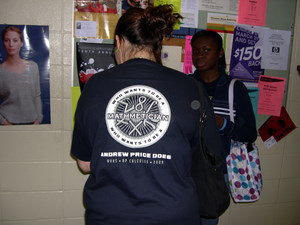 |
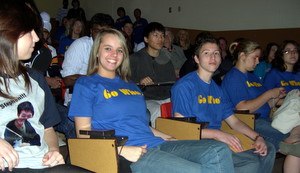 Left: White Hall, Above: North Little Rock East, Right: Morrilton ("q t pi") |
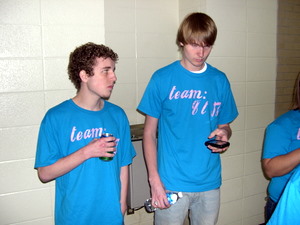 |
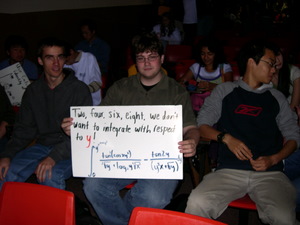 |
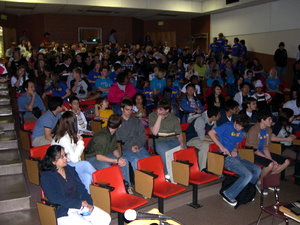 |
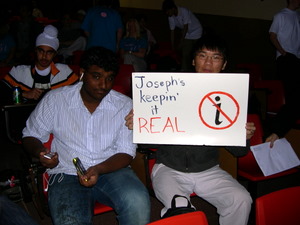 |
Contestants:
Front (left to right):
|
Back (left to right):
|
|
| In game one, Seemaab Ali and Stephen Hu emerged as the two contenders for first place. Stephen, a sophomore, had the biggest support team, who all cheered quite loudly each time his name was called. Since he also happened to be sitting closest to the audience, his hearing probably hasn't returned to normal, and until it does, he may temporarily be known as "Stephen Huh?". By answering the last question correctly, Seemaab won game one and assured himself a spot in the Square-Off Round. (Front: Seemaab Ali and Tiffany Biggers; Back: Stephen Hu and Andrew Price.) |
|
|
In game two, Izzie Joshi gave Joseph Berleant, a freshman, some competition, but it was Joseph who won first place. This earned Joseph $500 from the AMS and a TI-Nspire graphing calculator from Texas Instruments (both also won by Seemaab in game one). (Front: Joseph Berleant and Dolan Ellis; Back: Margaret Frost and Izzie Joshi.)
|
|
|
|
Joseph and Seemaab went head-to-head in the Square-Off Round, for another $500 and a chance at the $2000 Bonus Question. Seemaab signaled in first, but was incorrect. As Joseph's time was running out, he calmly signaled in and got the question correct. Unfortunately, Joseph did not answer the Bonus Question about trigonometry correctly, but he still had the $1000 and the TI-Nspire. |
|
Here are the prizes won by the eight contestants:
- TI-Nspire graphing calculator from Texas Instruments, and $1000 from the AMS: Joseph Berleant
- TI-Nspire graphing calculator from Texas Instruments and $500 from the AMS: Seemaab Ali
- Maple 12 from Maplesoft: Stephen Hu and Izzie Joshi
- Calculus with Early Transcendentals by Anton, Bivens and Davis from John Wiley and Sons: Andrew Price and Margaret Frost
- What's Happening in the Mathematical Sciences from the AMS: Tiffany Biggers and Dolan Ellis
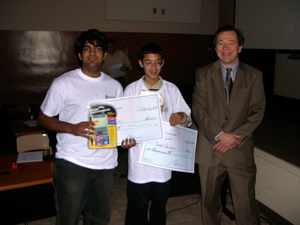 |
The two great audiences at these two events made for a wonderful way to wrap up Who Wants to Be a Mathematician's 2008-09 academic year. Thanks to all the teachers who mustered their troops for the lectures and contests, which made for two very enjoyable, exciting days in Arkansas. Thanks also to the sponsors, Texas Instruments, Maplesoft, and John Wiley and Sons, for their continued support of Who Wants to Be a Mathematician and mathematics students, and to Chaim Goodman-Strauss at the University of Arkansas and Ramesh Garimella at the University of Central Arkansas for all their work organizing the two events.
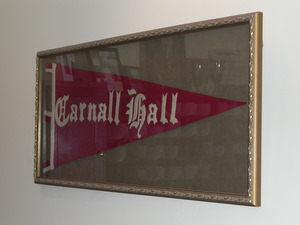 A misspelled leftover from a failed merchandising campaign for "Carnal Hal," the ill-fated sequel to the blockbuster "Shallow Hal" |
Photographs by Who Wants to Be a Mathematician judge and co-creator Bill Butterworth, DePaul University Department of Mathematical Sciences, and by Mike Breen, AMS Public Awareness Officer.
Find out more about Who Wants to Be a Mathematician.


